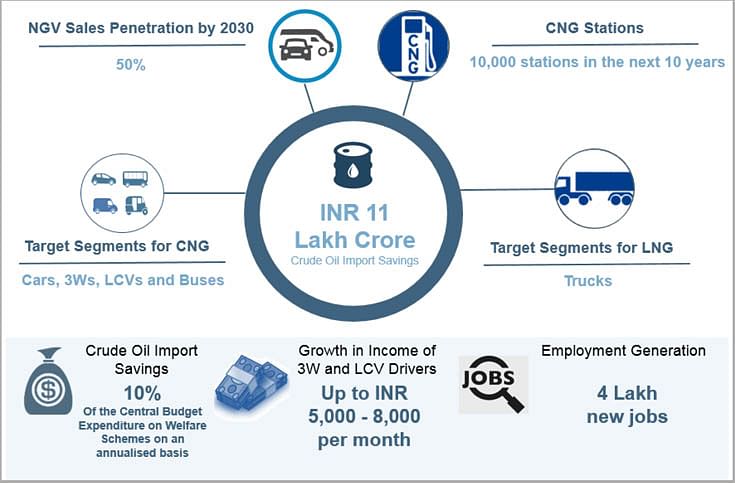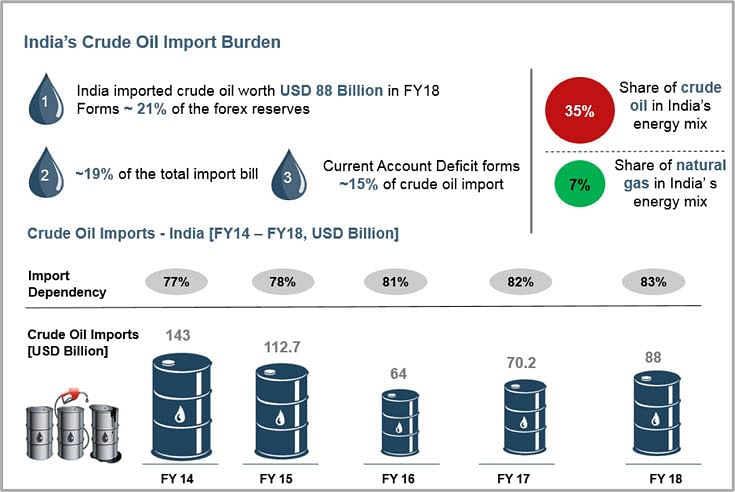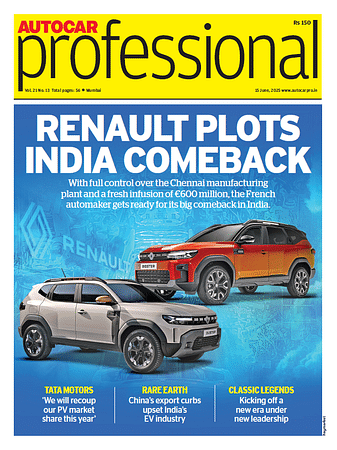Speedy CNG infrastructure development in India can enable huge savings on crude oil imports: Nomura Research
India imported crude oil worth US$ 88 billion in FY2018. Nomura Research Institute study says a sharp focus on natural gas vehicles could help achieve crude oil import savings of Rs 11 lakh crore by 2030.
Nomura Research Institute (NRI), a leading global management consulting enterprise, says betting big on CNG will help India sharply cut down its dependence on fossil fuels for transportation purposes. In its recently released report on ‘CNG Infrastructure Development: A boon for the Indian Economy’, Nomura Research says natural gas vehicles are the fastest way to reduce oil imports in the transportation sector.
High customer acceptance, availability of CNG vehicles and presence of local component manufacturing could facilitate quick substitute to oil imports and hence early realisation of the benefits. However, the sole and major constraint to the adoption of Natural Gas Vehicles (NGVs) is the NGV infrastructure and dispensing stations.
The current plan for natural gas infrastructure development unveiled by the government of India is a step in the right direction, says Nomura. It entails establishing 10,000 CNG stations in the next 10 years. Also the recently announced 10th round of CGD bidding by PNGRB will further catalyse the momentum by establishing more CNG infrastructure to additional 124 additional districts, taking total coverage to 52% of India’s area and 70% of population. These steps could also help achieve 50% sales penetration of natural gas vehicles by 2030 which in turn has the potential to achieve crude oil import savings of Rs 11 lakh crore (US$ 153 billion at current exchange rate) by 2030.

Oil’s not well
As the fastest growing economy in the world, India has an ever increasing demand for energy which has a 35 percent share of crude oil. The high oil imports – US$ 88 billion in FY2018 – are fuelling India’s high forex needs and have an adverse effect on the country’s current account deficit and currency exchange rate.
According to the Economic Survey of 2018, “It is estimated that a $10 per barrel increase in the price of oil reduces growth by 0.2-0.3 percentage points, increases WPI inflation by about 1.7 percentage points and worsens the CAD by about $9-10 billion dollars.”

The transport sector is amongst the largest consumers of imported oil (70% of diesel and almost all of petrol is consumed by the transport sector). With the automotive sector expected to witness an average growth rate of 8 percent till 2030, the current situation of energy security would likely further worsen if the energy mix in transportation is not diversified, says Nomura.
How to achieve CNG-driven gains
The report, prepared by Ashim Sharma, Partner & Group Head at NRI Consulting & Solutions, suggests that going forward, key action areas need to be explored to accelerate CNG and LNG adoption in India. They include:
De-bottlenecking and promoting investments in CNG infrastructure creation
− Institute a centralised program governance mechanism to sustain the momentum in CGD infrastructure projects
− Explore incentives to invite wider participation in pipeline infrastructure building
− Explore incentives for existing CGD players to expand city infrastructure in tandem with growth in demand, especially in metro cities. There should be positive economic incentives to invest in infrastructure building, along with penalties for delay.
Expand the CNG / LNG retail infrastructure
− Ramp up the expansion of LNG fuelling station network across highways
− Efforts should be made to concentrate and increase density of CNG stations within cities. Incentivise OMCs to co-locate CNG fuelling pumps at most existing retail outlets within cities.
− Centralised body to fast-track clearances for addition of CNG and LNG fuelling stations from central and state entities
− Incentivise the local manufacturing of cryogenic tanks for storage of LNG in trucks
− Use of the infrastructure, to high levels of capacity, should be encouraged. This requires strong coordination between automobile OEMs and city gas infrastructure builders
− As gas infrastructure building is high capex intensive, the speed of infrastructure building can be increased if low-cost, long-term capital is made available.
Citing some of the benefits of a switchover to CNG, the report says three-wheeler and LCV drivers/owners would see a monthly increase in income between Rs 5,000-8,000. Also, with CNG being 20-25% less CO2 emitting than conventional liquid fuels, it would help India in achieving the COP22 commitment of carbon footprint reduction. Most Indian metros and Tier 1 cities currently see pollution caused by PM emissions (PM 2.5 and PM 10); in CNG the PM emissions are claimed to be negligible.
While CNG is a proven and economically viable alternative fuel for IC-engined cars, three-wheelers, LCVs and buses, LNG makes better commercial sense for long-haulage trucks. LNG trucks enable storage of higher quantity of fuel in less space, leading to lower payload penalty and longer range compared to CNG. LNG is the only validated viable alternative to diesel in heavy commercial vehicles. This is also the reason why many countries globally are embracing LNG trucks. Use of LNG for intercity truck movement should be given priority and CV OEMs should be encouraged to change to LNG use in a definite period of time, recommends the report.
The Nomura Research report calls for on-ground action if there is to be speedy CNG infrastructure expansion and can only happen with the active support of State governments. Given the potential positive impact this could have on the Indian economy, natural gas infrastructure development projects must be treated like projects of national importance. This can be done by instituting robust project management mechanisms and fast-tracking of targeted efforts, closely resembling what was done for the development of the Delhi Metro by Delhi Metro Rail Corporation (DMRC).
Also read: Volkswagen India bets on CNG over electric
RELATED ARTICLES
VinFast’s second plant in Vietnam goes on stream ahead of India factory
Vietnamese EV maker’s second plant in its home market, which has a 200,000 EVs-per-annum capacity, will focus on produci...
Continental exits TBR market in India, shifts focus to car and SUV radials
German tyre manufacturer aims to tap the double-digit market growth opportunity for big SUV and luxury car tyres which w...
New ZF SELECT e-drive platform gives EV makers a choice in 100 to 300 kW range
Modular e-drive platform optimally matches 800-volt overall system and components such as the electric motor and power e...





 By Autocar Professional Bureau
By Autocar Professional Bureau
 30 Nov 2018
30 Nov 2018
 19347 Views
19347 Views












